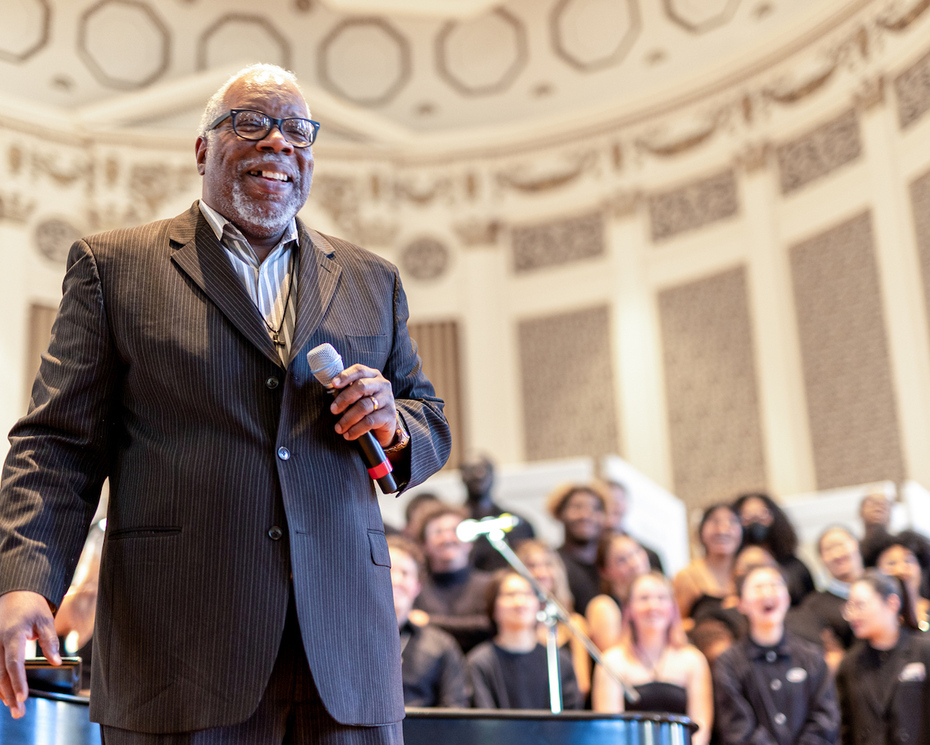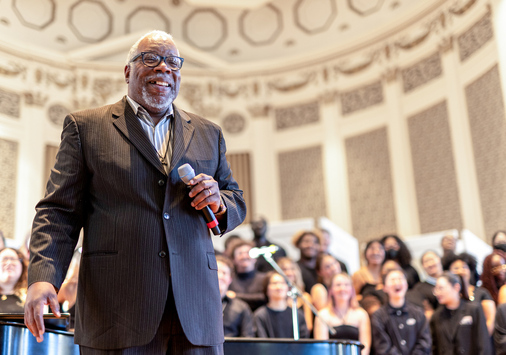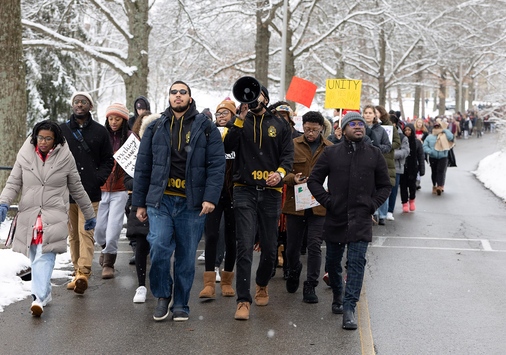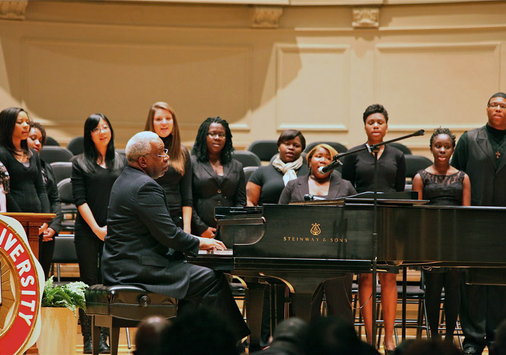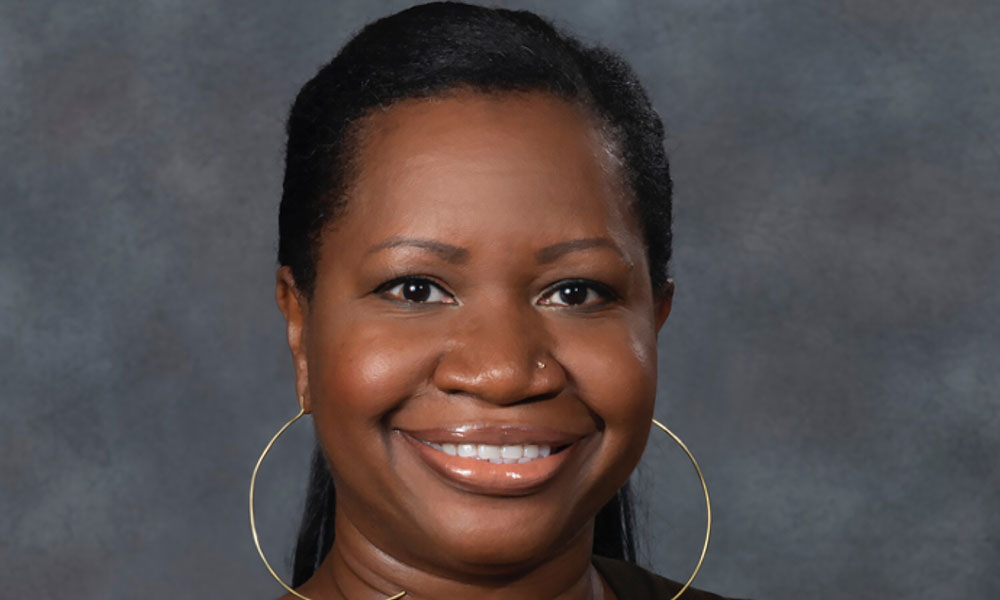
Monday, January 27, 2020
“Until Justice Rolls Down Like Waters”: Race, Poverty, Bodies and the Call to Social Action
As we commemorate Dr. King’s life and work this year, we look to “his last march” and seek to articulate King’s vision in contemporary times.
Our speaker Dr. Deirdre Cooper Owens will give her public keynote address, related to her book Medical Bondage: Race, Gender and the Origins of American Gynecology, on Monday January 27 at 1pm in Swasey Chapel.
DCA Service Events
10:00 am to 12:00 pm
Service Options |
Meeting Location |
|---|---|
Bag Lunches for Salvation Army |
Higley 223 |
Random Acts of Kindness around Campus |
Slayter 3rd Floor |
Stuffed Animals for Salvation Army |
Higley 326 |
Make bandanas for Humane Society |
Higley 008 |
Make Activity Books for Children’s Hospital |
Higley 413 |
Bake for Granville First Responders |
Open House |
Make thank you cards/ candy bags for Denison staff |
Higley 105 |
Make Door Hangers for Nursing Home |
Higley 405 |
Make After School Snacks for Boys and Girls Club |
Higley First Year Lounge |
All Campus Convocation
1 pm at Swasey Chapel
Performance by Tehillah
Keynote: “Why We Can’t Wait: Reckoning with Race and Health Inequalities,” delivered by Dr. Deirdre Cooper Owens, Historian
Deirdre Cooper Owens is The Charles and Linda Wilson Professor in the History of Medicine and Director of the Humanities in Medicine program at the University of Nebraska-Lincoln. She is also an Organization of American Historians’ (OAH) Distinguished Lecturer. A popular public speaker, she has published essays, book chapters, and blog pieces on a number of issues that concern African American experiences. Her first book, Medical Bondage: Race, Gender and the Origins of American Gynecology (UGA Press, 2017) won the 2018 Darlene Clark Hine Book Award from the OAH as the best book written in African American women’s and gender history.
Professor Cooper Owens is also the Director of the Program in African American History at the Library Company of Philadelphia, the country’s oldest cultural institution.
Medical Bondage is available to read as an e-book
Social Justice Breakaway Trip
3pm: Workshop I in Multicultural Center, Slayter 402
After recently returning from a 5-day immersive Social Justice Service Trip to critical locations of the Civil Rights Movement, our student panelists will share highlights of the experience. A moderated discussion will examine the implications of the Civil Rights Movement at the conclusion of the 20th century and into the 21st century. Panelists will share their perspectives on thematic principles learned around economic empowerment, racial equity and gender norms. There will be a few set questions, and then after we will open the panel to the audience.
Participants: Cierra King ‘20 (Moderator), Madelaine Baker ‘21, Katherine Cao ‘22, Amir Colbert Stone ‘22, Farah Hersi ‘22, Lariona Jacobs ‘20
Class, Wealth and Economic Justice Workshop
4:15pm: Workshop II in Burton Morgan 219
This is a training focused on Classism and Economic Justice. Participants will engage in group activities exploring class backgrounds and identities to discover their standing in and relationship with classism. Please note that some activities in this workshop may be physically demanding for folx with physical disabilities. This workshop uses two main tools (Popular Education and Community Organizing) to create social change.
Facilitated by Joan Do-Truong ‘23 and Michael Ball ‘22
Introduction
Twenty-Twenty has in some ways been marked as a prophetic year. It has served as a target year by theorists, scholars, policy makers, legislators, business leaders, non-profits, and others who have made projections about how certain social and political issues would be driven by particular demographic characteristics. These characteristics include race, class, gender, age, nationality, sexual identity, and other aspects of identities that constitute both the United States and its global interdependence. There is today, according to contemporary scholars of Dr. Martin Luther King, Jr., much speculation as to “what would Martin say?” It is a question that has enormous import in the year 2020. According to an article in The Atlantic, “In the months leading up to his assassination, King’s greatest focus was on poverty and economic injustice” (Delinger, 2018). It is not a stretch to infer that responding to King’s “last march” today would lead us to the Poor People’s Campaign. Neither is it a coincidence that in the year 2020, the most urgent issues of our time rest with the severe hardship on those facing poverty and the economic injustices of which this is a consequence.
Theme and Background
“Dr. King stressed the fundamental importance of cultivating a society that would benefit from its diversity through the extension of social justice and inclusion” (Clemmons, et al, 2017). As we move Dr. King’s agenda forward in the year 2020, in light of the stark increase in wealth inequality, and its concurrent human rights issues of access to housing, health care, education, fair labor practices, and many other social issues, “What would Dr. King say and what has he said?” More importantly, what would Dr. King call us to do? In light of his life work, how should we engage collectively in the tradition of nonviolent social change that Dr. King and so many others in the Civil Rights Movement modeled for us? For many scholars, King “is recognized as a beacon in the struggles of peoples worldwide seeking to eradicate conditions of oppression, including entrenched poverty and social deprivation, frequently reinforced by political and economic disenfranchisement. The tentacles of Dr. King’s work reach into the realm of public policy, including American foreign policy” (Clemmons, et al, 2017). Guided by poverty as the focus of Dr. King’s last march, the theme for this year asks us to focus on the year 2020 and how Dr. King’s unfinished legacy still calls us to action.
Keynote Speaker
Deirdre Cooper Owens is The Charles and Linda Wilson Professor in the History of Medicine and Director of the Humanities in Medicine program at the University of Nebraska-Lincoln. She is also an Organization of American Historians’ (OAH) Distinguished Lecturer. A popular public speaker, she has published essays, book chapters, and blog pieces on a number of issues that concern African American experiences. Her first book, Medical Bondage: Race, Gender and the Origins of American Gynecology (UGA Press, 2017) won the 2018 Darlene Clark Hine Book Award from the OAH as the best book written in African American women’s and gender history.
Professor Cooper Owens is also the Director of the Program in African American History at the Library Company of Philadelphia, the country’s oldest cultural institution. Currently, she is working on a second book project that examines mental illness during the era of United States slavery and is also writing a popular biography of Harriet Tubman that examines her through the lens of disability. She primarily teaches classes on the history of medicine.
Dr. Deirdre Cooper Owen’s keynote address is Monday January 27 at 1pm in Swasey Chapel.
On Tuesday January 28, in Burton Morgan 115, from 4:00-5:30 PM – Dr. Cooper Owens will present “What Genealogies Reveal: Slavery, Gender, and the Origins of American Gynecology,” based upon her book Medical Bondage (2017). This talk is part of this year’s Laura C. Harris Series on “Feminism, Health, and Social Justice.”
Suggested Reading List
- Michael L. Clemons, Donathan L. Brown, William H. L. Dorsey. Dream and Legacy: Dr. Martin Luther King in the Post-Civil Rights Era. Published by University Press of Mississippi
- Cooper Owens, Deirdre and Sharla Fett. “Black Maternal and Infant Health: Historical Legacies of Slavery” American Journal of Public Health 109 (2019): 1342-1345. https://doi.org/10.2105/AJPH.2019.305243
- Cooper Owens, Deirdre. Medical Bondage: Race, Gender, and The Origins of American Gynecology (UGA Press, 2017). (Available as an e-book)
- Dellinger, Drew. The Last March of Martin Luther King Jr. In the months leading up to his assassination, King’s greatest focus was on poverty and economic injustice. Atlantic. 2018.
- Jackson, Thomas F. From Civil Rights to Human Rights: Martin Luther King, Jr. and the Struggle for Economic Justice. Philadelphia, PA. University of Pennsylvania Press. 2007.
- King, Martin Luther, Jr. “In a single garment of destiny” : a global vision of justice / Martin Luther King, Jr. / edited and introduced by Lewis V. Baldwin; foreword by Charlayne Hunter-Gault, Beacon Press, 2012.
